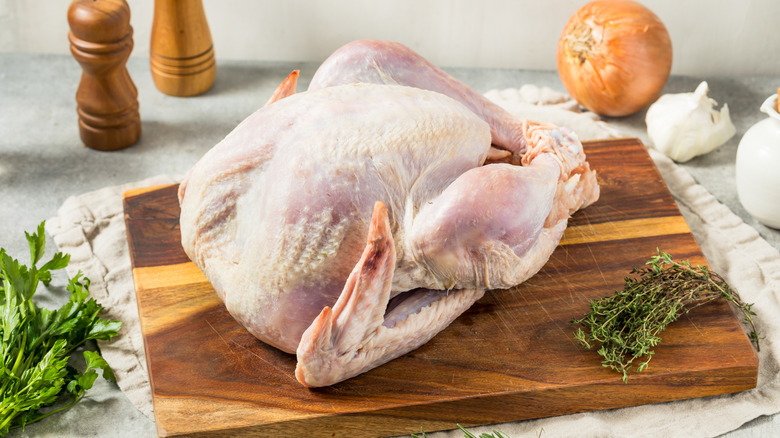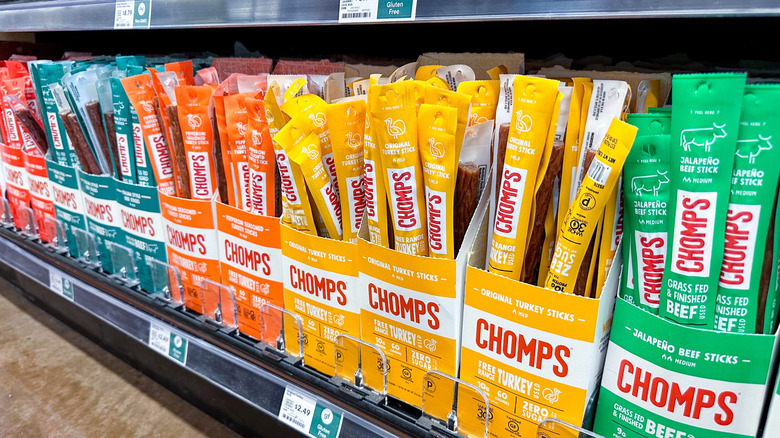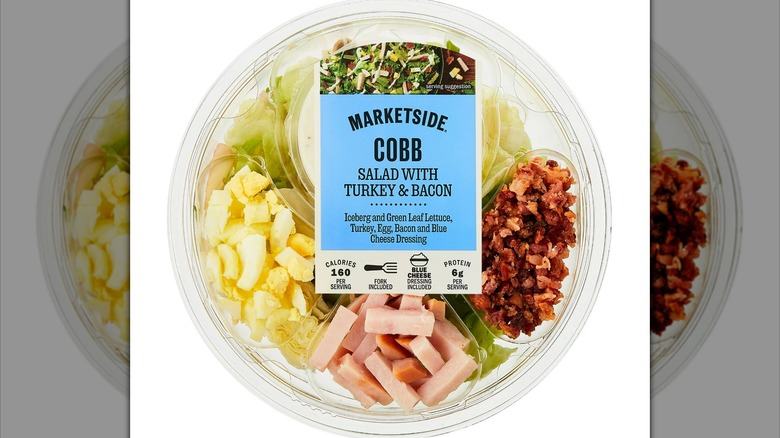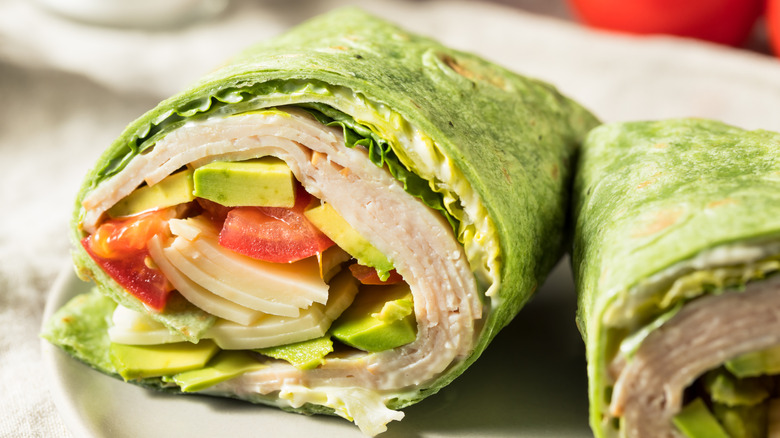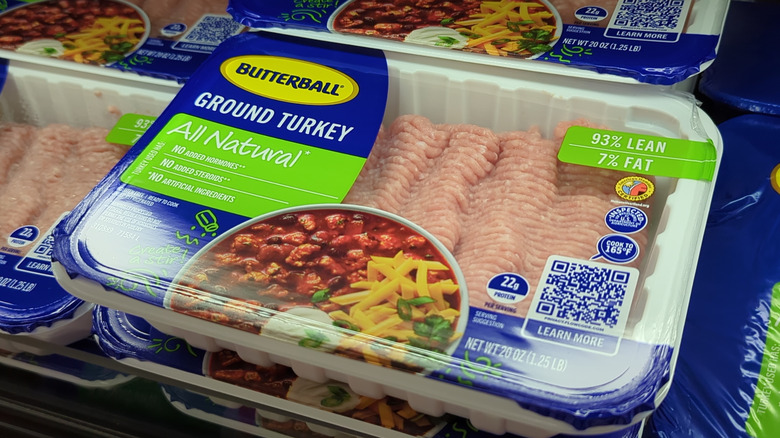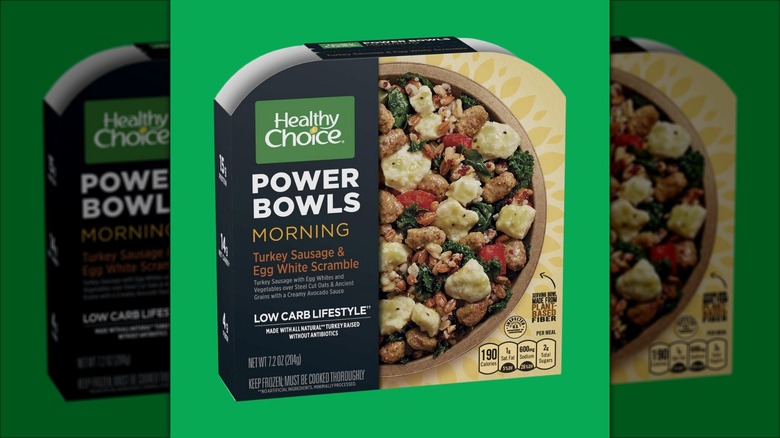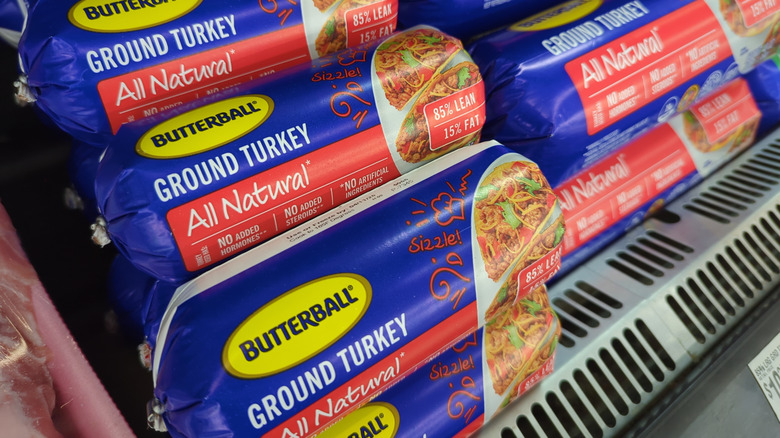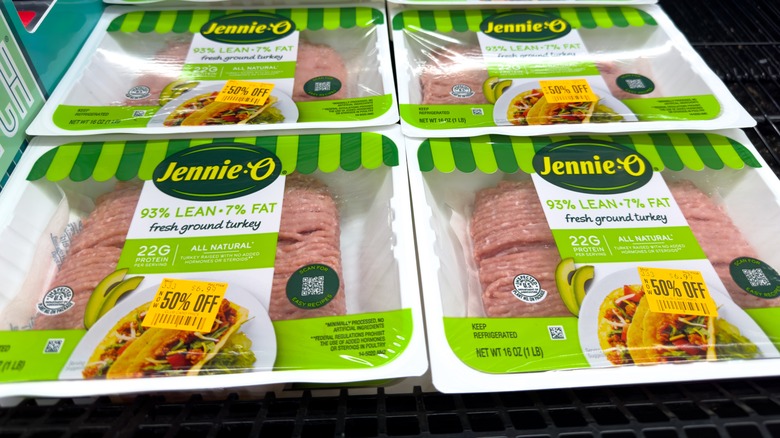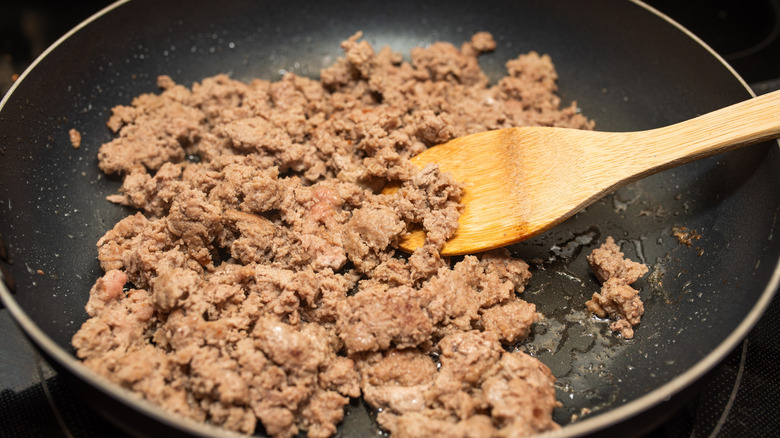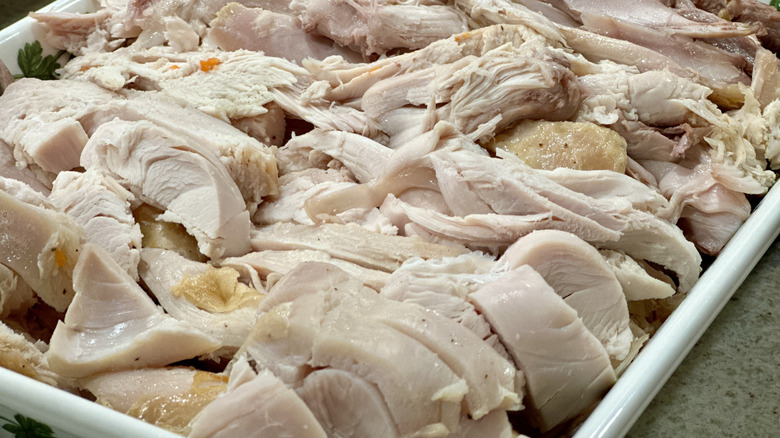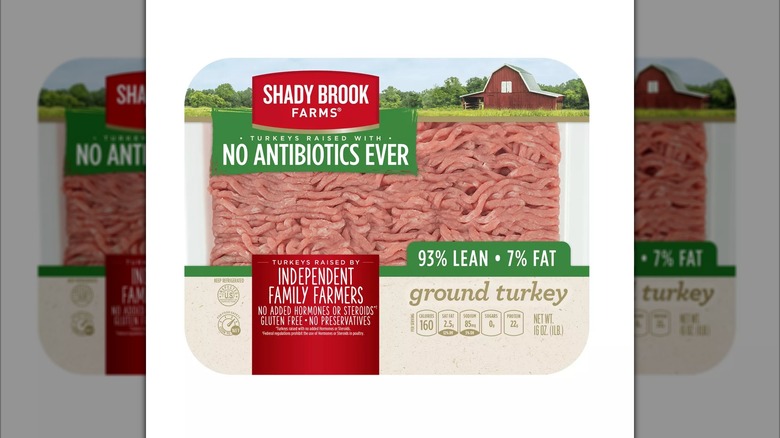16 Turkey Recalls That Impacted Millions
We may receive a commission on purchases made from links.
Millions of people look forward to eating their holiday turkey each Thanksgiving, even if that is the only time of the year they chow down on this tasty fowl. Others eat turkey on a more regular basis, taking advantage of the fact that turkey is one of the healthiest meat options out there. However and whenever you like to eat your turkey, though, take caution: Raw turkey can harbor some dangerous bacteria, such as salmonella, clostridium perfringens, and campylobacter, all of which can make you pretty ill.
Luckily, when it's discovered that bacteria like these have made their way into the food chain, turkey brands often issue recalls — but it's not just bacteria that's to blame for the myriad turkey recalls that have impacted millions of people throughout the United States over the last two decades. Other culprits include listeria, foreign objects mixed in with ground meat, and more. Here's what you need to know.
1. Chomps recalled turkey sticks due to metal fragments (2025)
When you think of jerky and similar meat sticks, you probably automatically assume that they're always going to be safe to eat. You don't have to worry about these products like you might raw, refrigerated, or frozen meat. They're preserved and ready to go, and can last in the pantry for an impressively long time.
However, an unexpected safety hazard prompted the Chomps brand to recall 30,000 pounds of its meat sticks, including its Original Turkey Sticks, in 2025. Two customers reported to the company that they'd found pieces of metal in the company's Original Beef sticks — and that's definitely something you don't want to chomp down on when you're snacking away. Chomps voluntarily expanded the recall to include turkey sticks produced in the same time period out of an abundance of caution.
Metal is frequently found in food products. When this occurs, it's called metal contamination, and it's one of the most popular reasons that food is recalled, alongside other, similar issues such as plastic contamination.
2. Gaiser's European Style Provisions recalled turkey bologna after misbranding (2025)
Sometimes, foods are recalled not due to a clear-cut safety hazard, but instead due to an issue that's seemingly more benign: misbranding. Misbranding is when a producer puts the wrong label on a food item, or an incorrect label on a food item. In a June 2025 recall, Gaiser's European Style Provisions, Inc., recalled more than 140,000 pounds of ready-to-eat bologna, including turkey bologna (yes, bologna can be made from all sorts of meats, including turkey, chicken, pork, and veal), because of this issue.
According to the Food Safety and Inspection Service (FSIS), the labels on the bologna did not include necessary information regarding "meat or poultry source materials." However, it could have been difficult for consumers to know whether or not they had purchased or consumed the affected bolognas in this instance, as some of it was sold in delis at retail stores, where the bologna would have been sliced and wrapped for the customer to take home in a nondescript, unlabeled pack. Luckily, the FSIS gave the recall its lowest safety risk ranking for recalls, a Class III ranking, which means the organization does not expect the recalled product to cause anyone any serious health problems.
3. Turkey salad and wraps recalled as part of massive BrucePac listeria outbreak (2024)
If you've read up on other major recalls from 2024, such as major recalls for ready-to-eat meats or major frozen food recalls, you may have come across the BrucePac listeria outbreak. In the latter half of 2024, BrucePac, a producer of various meat products that are then distributed to a variety of brands for use in other products, recalled nearly 12 million pounds of food due to concerns over listeria. More than 75 products were impacted, including a Marketside turkey cobb salad sold at Walmart and turkey club wrap sold at Trader Joe's.
The recall occurred after one of the affected products tested positive for listeria, but BrucePac reported at the time of recall that no actual illnesses had been associated with the recall. That's good news, considering that a listeria infection is one nasty experience. While a mild case of infection causes gastrointestinal distress, more severe cases can cause issues like seizures or even fatalities, and pregnant individuals are most at risk for severe cases.
4. Salm Partners recalled turkey kielbasa twice for foreign matter (2024)
In the span of just a few months, Salm Partners, which produces sausages and hot dogs for a handful of brands, issued recalls for not one, but two brands of turkey kielbasa, both due to foreign matter being found within the sausages. In the first instance, in January 2024, the manufacturer recalled Parkview turkey kielbasa, because consumers began complaining that they were finding bone fragments in the kielbasa. In fact, one consumer even reported that they injured their mouth on the bone fragments.
While bone fragments are at least somewhat understandable in a processed meat product, it's less forgivable to find pieces of rubber in your turkey kielbasa. That, though, was exactly what prompted Salm Partners to recall more than 35,000 pounds of Johnsonville turkey kielbasa in March 2024. Again, it was consumers who had to bring the issue to light, but in this case, at least no one reported being harmed by finding the rubber where it didn't belong.
5. Pruski's Market's turkey jerky recalled due to undeclared allergens (2023)
The U.S. government requires that manufacturers list common food allergens on their product packaging, if that allergen is found within the product. The common-sense rule just keeps everyone safe. As such, when it's discovered that a product does contain an allergen, but the packaging doesn't list it, a recall is required.
This was almost the case in 2023, when Pruski's Market turkey jerky was recalled for containing soy. However, a true recall was not issued as, by the time the problem was discovered, the product was no longer available for purchase. As such, the FSIS issued a public health alert instead, informing the public of the potential health risk that could come with eating the jerky. A public health alert is issued any time the FSIS recognizes such a risk, but cannot issue a formal recall just yet.
If you don't think that soy is that big of a deal, and really isn't a "risk," consider that approximately three out of 1,000 adults are allergic to soy and about 0.4% of children are allergic to soy. An allergic reaction can range from esophageal inflammation to anaphylaxis.
6. Jennie-O turkey meatballs recalled for incorrect packaging (2023)
Some recalls are issued because not only does the packaging fail to declare all ingredients in the product, such as allergens, but because the product found within the packaging isn't at all what the packaging exterior promised. Imagine your surprise when you think you purchased a box of turkey sausage, but you open up the box and find turkey meatballs instead. That was the case for some consumers in April 2023, prompting the recall of nearly 12,000 pounds of Jennie-O frozen turkey meatballs. In this case, the product had been distributed to hotels, restaurants, and institutions.
While some would simply open up the box, see what awaited inside, and adjust their dinner plans, this inadvertent switch posed a threat more serious than just a minor inconvenience to some. The meatballs contain soy, a major, popular allergen, and one that can cause fatal allergic reactions in severe cases.
7. Rachael's Food Corporation recalled turkey wraps for listeria contamination (2022)
In 2022, several brands of turkey wraps, including Rachael's Food Corporation and Atlantis Fresh Market wraps, tested positive for listeria. More than 2,200 pounds of the wraps were then recalled from retail locations throughout Connecticut, Massachusetts, Rhode Island, and New York.
Deli meats are very often recalled, as are products like these that contain deli meats, for multiple reasons — but the primary culprit is typically listeria. Deli meats provide listeria with a prime breeding ground, as the bacteria loves a moist home and it can be easily transmitted from a listeria-carrying animal to the final product. Additionally, listeria survives cold temperatures and other preservation methods that may kill similar foodborne illness-causing bacteria. It's suspected that listeria outbreaks are on the rise, too, even though infection is still technically considered rare, with about 1,600 people falling ill with the bacteria in the United States annually. The Centers for Disease Control (CDC) recommends pregnant individuals, the elderly, and those with weakened immune systems avoid eating unheated deli meat, like turkey, entirely.
8. Butterball recall prompted by blue plastic contamination (2021)
Butterball and turkey go hand in hand. It's the brand that many think of when imagining their Thanksgiving bird. Despite being a household name brand, Butterball is not immune to the occasional recall. In 2021, Butterball recalled more than 14,000 pounds of ground turkey after shoppers began to complain that they were finding pieces of blue plastic mixed into the ground poultry. The same recall impacted ground turkey sold under the Kroger store brand. Unfortunately, through the recall, only about 2,500 pounds of turkey was actually recovered, meaning about 13,500 pounds of the plastic-contaminated turkey was still being eaten, unless consumers tossed their turkey in the trash.
Luckily for Butterball (and Butterball fans), the brand was able to avoid any further recalls for the next few years following this incident. However, the brand was not able to avoid rumors of recalls. In 2024, rumors swirled that Butterball turkeys would be recalled, following the release of videos of alleged animal abuse within Butterball facilities; however, no recall actually occurred.
9. Plainville Brands recalled ground turkey products due to salmonella outbreak (2021)
In 2021, the FSIS issued another turkey-related public health alert instead of a recall. The product in question was no longer available for purchase at the time of the alert, but the ground turkey at the center of concern still posed a potential threat to public safety. From December 2020 and into March 2021, the FSIS and the CDC teamed up to investigate a multistate outbreak of salmonella poisoning. There were nearly 30 reported cases of illness across 12 states, and the organizations' findings turned up a packet of ground turkey that tested positive for salmonella.
The public health alert issued as a result applied to more than 200,000 pounds of raw ground turkey produced by Plainville Brands, LLC, including turkey sold under the Nature's Promise, Plainville Farms, and Wegmans store brands. The good news? You can kill salmonella if you cook foods to a temperature of 145 degrees Fahrenheit or higher.
10. Healthy Choice turkey power bowls recalled due to rocks (2020)
During a busy workday or after a stressful commute, sometimes you just want to reach for a convenient, microwavable meal for a quick bite to eat. What you don't want to find in that quick bite? Rocks. Unfortunately, if you purchased one of several variants of Healthy Choice Power Bowls in 2020, you could've found small rocks scattered throughout your lunch.
In May of that year, Conagra Brands recalled nearly 300,000 pounds of Healthy Choice meals, including Turkey Sausage & Egg White Scramble bowls, that had been shipped out all over the United States and Canada, as customers began complaining they were finding small rocks in their food. How exactly would a rock get into a microwavable meal? In some cases, rocks wind up in food because they're picked up during the harvesting of an ingredient (like produce), and they're just never properly removed.
11. Butterball faces salmonella-related recall (2019)
While the 2021 Butterball recall was the most recent for the brand, it wasn't Butterball's first recall. Just two years earlier, in 2019, Butterball recalled ground turkey sold both under its own brand and under store brands at Kroger and Food Lion, due to suspected salmonella contamination. The recall impacted nearly 80,000 pounds of ground poultry.
The recall came after the FSIS and CDC began investigating a salmonella outbreak impacting five patients from two different states. Sound like five people is just too few for an actual "outbreak?" The CDC defines an outbreak as any event in which at least just two people contract an illness from the same contaminant. As you could imagine then, outbreaks, while sounding serious, are actually pretty common. In fact, salmonella is one of the most common causes of foodborne illness, with more than a million Americans contracting it annually. Of these million Americans, about 26,500 are hospitalized per year, while approximately 420 people die from salmonella each year.
12. Jennie-O ground turkey recalled due to salmonella (2018)
Butterball isn't the only popular turkey brand to go through a salmonella-related recall. In 2018, Jennie-O also recalled a large amount of ground turkey — 164,210 pounds — following a salmonella outbreak.
This outbreak was particularly large, too. At the time of the recall, the FSIS noted the outbreak was reportedly impacting more than 200 patients across nearly 40 states. All of the patients reported eating various types of turkey, but that turkey came from various brands and various stores, meaning the outbreak couldn't be blamed on Jennie-O alone. Some patients also reported feeding their pets raw turkey pet food, while others reported working around or living with someone who works around turkeys. By the time of the CDC's final outbreak investigation report, the organization had connected 358 illnesses across 42 states, and 133 hospitalizations and one death, to the outbreak. The outbreak had also spread to Canada.
13. Metal shavings prompt Prestage Foods turkey recall (2017)
In 2017, another recall connected to metal contamination resulted in 38,475 pounds of Prestage Foods, Inc. ground turkey products being recalled across Alabama, Connecticut, Florida, Georgia, New York, North Carolina, South Carolina, Pennsylvania, and Tennessee. Sold under store brands at Weis and Publix, and under the Fit & Active brand, the turkey contained bits of metal shards.
Fortunately, in this case, it wasn't the consumers that were raising the red flag after finding metal in their meat. Instead, plant workers discovered something was wrong when they were cleaning equipment, and reported it to the FSIS. Then, shortly after, stores called in reporting that they saw the metal shards in the turkey packaging. The FSIS gave the recall a Class II risk ranking, meaning that the organization determined that there was a small possibility of an adverse health problem, if someone were to eat the turkey. Still, regardless of how small or large that possibility, no one wants to eat metal shavings.
14. Michigan Turkey Producers recalled turkey breasts due to foreign matter contamination (2016)
A lot of times, the "foreign matter" found in recalled foods is relatively easy to identify. More often than not, the foreign matter is plastic or metal, but sometimes it's something a little odder, too (as was the case when McCain Foods had to recall bags of hash browns because people were finding bits of golf balls in them). However, occasionally, you just don't know what exactly the foreign matter is, only that it shouldn't be eaten.
One example of this was in 2016, when Michigan Turkey Producers recalled more than 54,000 pounds of turkey breasts (and recovered an impressive 51,215 pounds of the product) due to an unidentifiable black material. Was it plastic? Was it rubber? No one could be sure. The impacted products had been sent to food service providers in Florida and Puerto Rico, at which point a customer complained of finding the odd item in the cooked, whole, and sliced turkey breasts.
15. Cargill Meat Solutions recalled ground turkey products due to salmonella outbreak (2011)
Yet another massive salmonella outbreak can be linked to turkey. In the fall of 2011, Cargill Meat Solutions, which produces turkey products under brands like Honeysuckle and Shady Brook Farms, recalled 36 million pounds of ground turkey in August and then another 185,000 pounds of ground turkey in September. The producer's ground turkey had been connected to patients who had fallen ill during the outbreak, and after the FSIS investigated the Cargill plant, it found that ground turkey samples therein tested positive for salmonella.
In this particular outbreak, more than 130 people fell ill over 34 states, over the course of seven months, with the outbreak finally ending after the September Cargill recall — indicating that perhaps Cargill's turkey had been making people sick for quite a while. One death was reported in the outbreak. Of the individuals that contributed data to the CDC and FSIS investigation into the outbreak, more than half confirmed eating ground turkey.
16. HoneyBaked recalled listeria-contaminated turkey (2006)
In 2006, a HoneyBaked Ham Co. recall earned the FSIS's highest danger ranking, garnering a Class I-level risk, which informs consumers that eating a recalled food will probably result in a serious health consequence or death. The recall impacted nearly 50,000 pounds of cooked ham and turkey (so think deli meat) that could have been contaminated with listeria. The ham and turkey had been sold throughout Ohio, as well as to customers who placed orders via phone or online. HoneyBaked discovered the contamination after its products underwent microbiological testing.
Luckily for HoneyBaked, this recall wasn't nearly as large as some of the others that have impacted deli meat like ham and turkey over the years. For example, in late 2024, Perdue Premium Meat recalled more than 2 million pounds of ham and pepperoni due to listeria. Ham was also part of the widely publicized and massive Boar's Head recall that occurred in 2024, and which was associated with nearly 60 hospitalizations and at least nine deaths.
